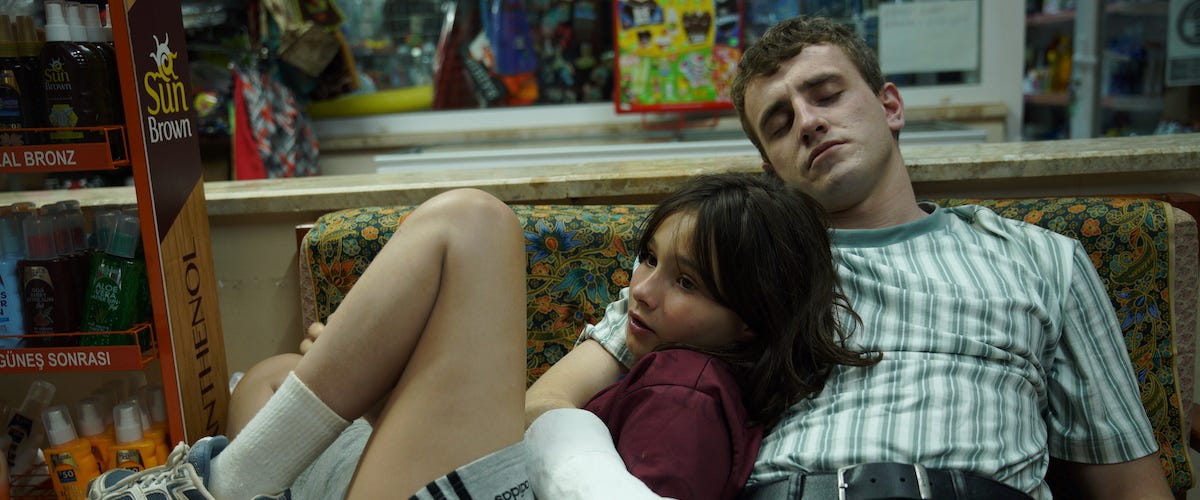Viennale Diaries: Day 3
Fathers and daughters take center stage for A24.
The Whale
It’s one of those interesting, unplanned things that happen at film festivals - watching two movies that focus on the same family dynamic (from the same studio no less). In this case it’s the father-daughter relationship, and Aronofsky’s The Whale was first up.
I’ve seen every Darren Aronofsky movie. He’s one of a small handful of American directors who have genuinely fascinated me since the very beginning (1998’s Pi). And it wouldn’t feel right if I didn’t just say it right off the bat: he just does it for me. So I’ve been imploding with anticipation for The Whale ever since it was announced.
It’s everything I expected it to be, and yet it still managed to catch and choke me by surprise. Knowing nothing about the Samuel D. Hunter play it’s based on helped. The obvious elephant in the room is the elephantine Charlie (Brendan Fraser), a 600-pound gay English professor who has been gorging on food ever since the death of his boyfriend. You don’t get stories centered around characters like that every day. But that alone wouldn’t be enough to peak Aronofsky’s interest in Hunter’s play.
It’s Charlie’s semi-spiritual road to redemption through his attempt at reconciling with his estranged and abrasive 17-year-old daughter Ellie (Sadie Sink) that lies at the heart of the story and that, I’m willing to bet, got Aronofsky’s full attention. Its closest relative is The Wrestler, and much like that redemption story, The Whale is compact, intimate, visceral and economical with its time. It’s also centered around a performance for the ages much like Mickey Rourke’s was.
Fraser is the film’s multi-layered fulcrum (both physical and emotional), and a big reason why The Whale succeeds. He’s been all but forgotten and clearly needed a career-defining performance like this to show the world what a tremendously vulnerable, sensitive and powerful actor he is. If Fraser’s performance doesn’t move you, I wouldn’t let you anywhere near my kids (if I had kids).
The entire cast is fantastic, it must be noted, as all ensemble casts for movies based on stage plays should be. From Sink to Samantha Morton (who plays the mother and has one scene, but what a scene it is) and Hong Chao (who plays Charlie’s nurse Liz) and Ty Simpkins (a teenage evangelist with secrets of his own). They give their all for Aronofsky, who in turn gets to show off his absolute mastery when it comes to taught interior direction. We’ve seen it before in mother! and Black Swan and The Wrestler. And you get the sense that the compressed compositions in The Whale - made all the more claustrophobic and uneasy thanks to Charlie’s mega-plus-size appearance and the 4:3 aspect ratio - could only have worked with Aronofsky at the helm.
The finale deserves an essay of its own. It’s unapologetically staged and artificial, but my God is it effective. I’ve rarely been as moved as I have in the final minutes of The Whale. Slack-jawed, wide-eyed, tears aflow, pupils dilated probably. Just thinking about it still gives me goosebumps.
Aronofsky has added yet another brilliantly introspective and contemplative film to his name. As an exceptionally hard movie to sit through that’s just as equally life-affirming, The Whale works wonders, and its take on religion, faith and what it means to be a good person is well worth thinking about.
Aftersun
Charlotte Wells’s father-daughter story couldn’t be more different. Where The Whale is fictional and based on a stage play, Aftersun is an original story that feels so personal it’s as if Wells made it for herself and her closest inner circle, and only on second thought decided to send it to film festivals (where it went on to receive some of the biggest praise out of any movie in 2022).
The Whale is also the eighth feature film from a well-established master of the craft, while Aftersun is a debut feature from someone who is clearly still experimenting. Through homemade videotape footage we enter a memory of a father, Callum (Paul Mescal), and his young daughter, Sophie (Francesca Corio), while they vacation in Turkey. We don’t know much about them to begin with, and we don’t find out much else by the end.
I found myself attempting to piece things together, trying to figure character’s thoughts out, wondering about all the things Wells was not choosing to show. This created a strange dissociation from the mundane life moments between Callum and Sophie that were being shown, which unfortunately allowed boredom to creep in.
The interwoven scenes of an adult Sophie (Celia Rowlson-Hall) dancing with Callum under the strobe lights only welcomed more confusion, although a dancing scene to “Under Pressure” (the version with David Bowie, which just might be the greatest song ever recorded) is pretty damn special. That said, Aftersun left me feeling pretty detached from Sophie and Callum since Wells never really gives us a chance to get to know them beyond their love for one another. Sure, character traits abound (Sophie is curious, Callum is cautious, etc.) but it wasn’t enough for me to care.
Regardless of how charming the chemistry between Mescal and Corio is (and it is), Aftersun was not an easy movie to sit through, leaving all the questions unanswered and the entire purpose of the film slumped under an ambivalent cloud.



